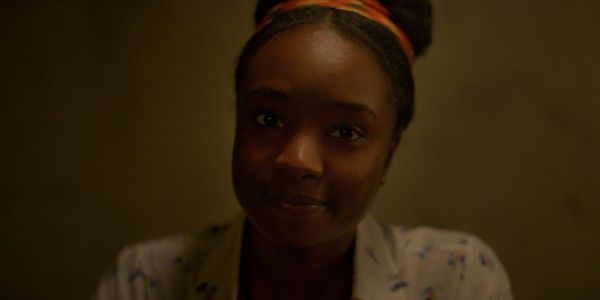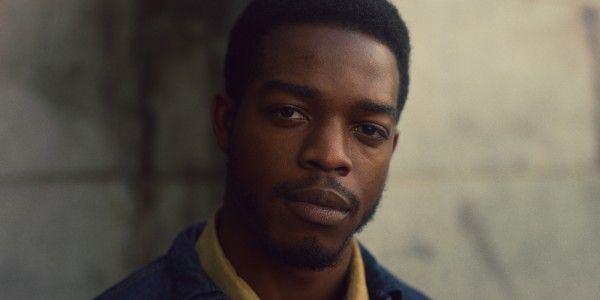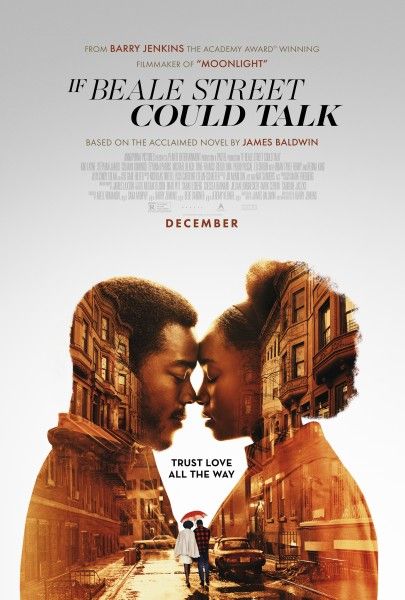[This is a re-post of my review from the 2018 Toronto International Film Festival. If Beale Street Could Talk opens today in limited release.]
On the surface, Barry Jenkins’ adaptation of James Baldwin’s novel If Beale Street Could Talk seems like a surefire winner. James Laxton's cinematography is lyrical and gorgeous. Nicholas Britell's score is melancholy and haunting. The performances are deep and devoted. The tone is achingly earnest. And yet Jenkins’ latest movie is less than the sum of its parts. Jenkins attempts to tell both a love story and a story about racial injustice, and yet both narratives end up feeling rote and predictable with neither being served in a way that would give them a badly needed spark. It’s a movie more likely to give the audience whiplash than let them feel the power of love or the trauma of American injustice towards black people.
Tish (KiKi Layne) and Fonny (Stephan James) are young and deeply in love in 1970s Harlem. However, when Victoria Rogers (Emily Rios), at the behest of a corrupt cop Officer Bell (Ed Skrein), accuses Fonny of rape, he’s thrown in prison just as Tish discovers that she’s pregnant with their child. As Fonny sits in prison, Tish and her family resolve to find a way to get Fonny free in time for the birth of their child. The story then cuts back and forth between Tish and Fonny’s idyllic love story in the past and the harsh reality of the present with an America devoted to throwing black people in prison when it’s not busy denying them fair housing.
In its best moments, If Beale Street Could Talk is about the lives we hope for and the lives we’re given, and the disparity between the two. The lives we hope for are represented in Fonny’s pre-incarceration as he and Tish spend time trying to build their life together. It’s a glimpse into a world that might give them a fair shake with modest hopes and dreams of raising a family together in Harlem. The lives we get are in the system we can’t ignore where black men have almost no hope against cops and prosecutors who want to feed black bodies into the prison industrial complex. Jenkins tries to bridge his love story with his social story, but Beale Street ends up getting lost in between.
Part of the problem is that no one comes off like a real person. Everyone speaks with the eloquence of James Baldwin, but dialogue that works on the page doesn’t necessarily sound realistic when spoken on screen. The words feel stilted and unnatural even though all the actors have a good read on their characters. The lack of cohesion is clearest in Tish, who also functions as the film’s narrator and speaks with a wisdom far beyond anything she ever demonstrates in individual scenes. She’s both a sage observer of American racial politics and a young woman just trying to free the man she loves from prison. Despite Layne’s strong performance, the character seems contrived, turned into a cipher at best and a mouthpiece at worst.
The visual lyricism and confidence Jenkins brought to his previous feature, Moonlight, is still on display here, and yet this time it fails to bring the material to life. Instead of letting us get inside the characters’ heads it now feels like we’re watching them behind glass. Perhaps this is intentional as Tish must converse with Fonny behind glass when he’s incarcerated, but it still puts us at a distance as viewer. There’s a level of artifice that diminishes both the romance and the social consciousness the film hopes to illuminate, and while the reverence for Baldwin is undeniable, his words come off as cold and inert.
What’s most frustrating about If Beale Street Could Talk is that its goals are so noble. I’d love to get wrapped up in a story of two young people in love who must fight against a corrupt system so that they can be a free family. But movies aren’t taken piecemeal. They’re holistic, and while I can point to individual elements where Jenkins has made a strong picture, the overall picture is frustratingly scattered. You’ll get a scene where a friend of Fonny’s (Brian Tyree Henry) comes in to give a heartbreaking account of how the system screwed him over and tossed him in prison for two years for a crime he didn’t commit, and then that friend is never heard from again, rendered into an example rather than a person. You can see the broad outline of what Jenkins wanted to accomplish with If Beale Street Could Talk, but the inside is hollow.
Rating: C




